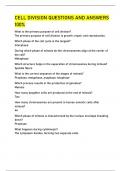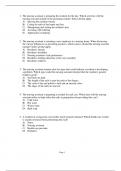Summary
Summary Bacterial Diversity
- Course
- Institution
The summary includes: Information on bacterial phyla specifically looking at Actinobacteria, Bacteroidetes, Firmicutes, Deinococcus-Thermus, Proteobacteria and Spirochaetes. Identifies and differentiates between the bacterial phyla described above. Examples from each of the bacterial phyla are d...
[Show more]








